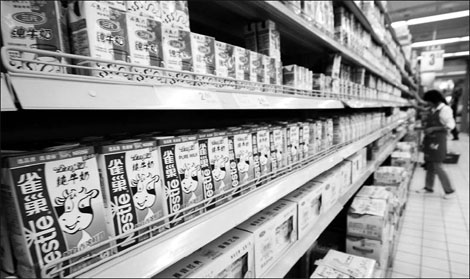Nestle (China) Chairman and CEO Patrice Bula said that the firm's sales revenue this year will be unaffected by the recent tainted milk crisis, with the world's biggest food firm even considering an expansion in the country.
 |
| Nestle products on display at a supermarket in Beijing. |
Bula added that sales of some of the firm's products, such as full-cream powdered milk, had even registered a slight increase since the outbreak of the crisis.
"Dairy products are only part of our business in China, we have many other products like coffee, chocolate and water," he said.
Nestle is expected to see double-digit growth in its China sales this year.
"We plan to expand the production of our Inner Mongolia and Qingdao factories next year. New products will also be released," Bula said.
Nestle has three dairy plants in China, in the Inner Mongolia autonomous region, and Heilongjiang and Shandong provinces.
Its plants in Shuangcheng, Heilongjiang province and Inner Mongolia mainly produce milk powder, while the factory in Qingdao, Shandong province, mainly produces liquid milk and ice cream.
According to Bula, production at the firm's Chinese plants was unaffected by the tainted milk crisis.
Nearly 94,000 people were sickened by milk powder contaminated with melamine, a chemical additive. The tainted milk has killed at least four infants.
The chemical was added to milk to make it appear to have a higher protein content.
"The crisis affected the consumption of all of China's dairy products, but I am sure the industry will recover soon," said Bula.
Some Nestle milk powder in Hong Kong reportedly contained melamine at the end of September, but Hong Kong's food and environment department later denied the reports and claimed that the involved Nestle milk powder products contained no melamine.
The income of farmers who signed contracts with Nestle was not affected by the crisis.
"A lot of farmers in Inner Mongolia and some other places dumped their milk or killed their cows after the crisis happened, but we were lucky, as nothing has changed in our lives up to now," said Li Yu, a 41-year-old farmer from Shuangcheng and a contractor for Nestle.
(China Daily October 28, 2008)